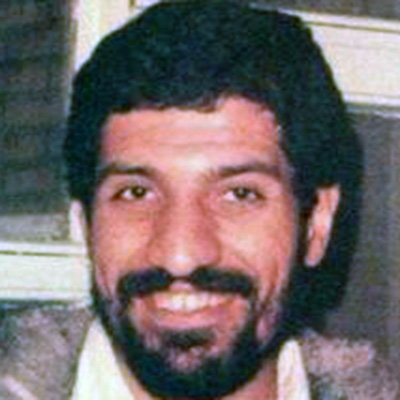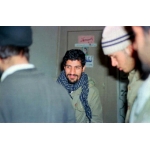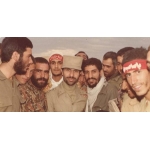Ahangaran, Muhammad Sadeq
Author: Fatemeh Khademi
524 بازدید
Muhammad Sadeq Ahangaran is a renowned Iranian eulogist whose elegy recitations significantly impacted the morale and determination of soldiers during the Iran-Iraq War.
Muhammad Sadeq Ahangari, commonly known as Sadeq Ahangaran, was born in February 1957 in Ahvaz. He used to go to the Marashi Mosque with his father, who would regularly recite supplications after the daily congregational prayers in a melodious voice, leaving a positive impact on his son[1]. At the age of twelve, Ahangaran recited an elegy for the first time during the days of Tasua and Ashura.[2] Later on, he would often do so at the Chitsaz Mosque in Ahvaz. He completed his secondary education at Farhang and Shahpur high schools in Ahvaz and eventually graduated from Khordad Niakan High School in Tehran.[3]
In 1977, Ahangaran was conscripted into military service. He underwent six months of preliminary military training in Karaj and was then transferred to Kurdistan as a member of the Propagation and Development Corps, where he worked in the wildlife conservation section for a year.[4] In the meantime, due to his connections with clergymen exiled to Marivan, he was arrested by SAVAK and spent one month in enforced exile in a border area called "DeleMarz". With the intensification of revolutionary activities leading up to the victory of the Islamic Revolution, he deserted the army on the orders of Imam Khomeini (ra), returned to his hometown Ahvaz, and lived secretly in Dezful for several months.[5]
After the victory of the Islamic Revolution in February 1979, Ahangaran began his activities at the neighborhood mosque in Ahvaz.[6] Later, a committee named the Parastoo Committee was formed in Ahvaz, headed by Ali Shamkhani. As members of this committee, Ahangaran and his friends were involved in operational work, fighting against the opposition elements while also recruiting new forces. Ahangaran was also in charge of the armory. Given that the Arab People's Organization was conducting acts of sabotage with the support of the Baath Party of Iraq, they decided to form the Islamic Revolutionary Guard Corps (IRGC).[7] Therefore, in a meeting held at Hossein Alam al-Hoda's house,[8] Ali Shamkhani and Ahangaran were chosen to be commanders of the Ahvaz IRGC and the Deputy Head of HR respectively. After the establishment of the Ahvaz IRGC and the designation of its headquarters, Ahangaran in addition to engaging in cultural and educational activities was also tasked with teaching lessons about the wars occurred in the early stage of Islamic history.[9]
Simultaneously with his activities in the IRGC and organizing training classes, Ahangaran, with the help of his brother Hamid, who had started a theater group, joined this group and for some time worked with Hossein Panahi[10] in the theater.[HR1] [11]
Ahangaran got married on February 8, 1980, resulting in the birth of two sons, Muhammad Ali and Hossein, and a daughter, Zahra.[12]
With the outbreak of the Iran-Iraq War on September 22, 1980, the IRGC forces of Khuzestan were among the first to confront the invasion. Ahangaran participated in numerous operations alongside other IRGC members. He would recite elegies and epics he had during his childhood at the frontlines. The elegy Ey Shahidan Beh Khoon-Ghaltane Khuzestan Ahangaran recited at the Jamaran Hussainiya, became popular among the Iranian forces thereby bringing him fame.[13]
Ahangaran took part in the operations Susangerd (November 17, 1980, the liberation of Susangerd) and Tariq al-Quds (November 29, 1981, the liberation of Bostan), where he not only took part in military operations but also recited supplications and elegies.[14]
When reporting the news of the liberation of Bostan and the organization of a session for reciting Dua Kumayl, the television announcer mistakenly pronounced his name as "Ahangaran" instead of "Ahangari" and that name stuck.[15]
Following the operation Tariq al-Quds, Mohsen Rezaei, the commander of the IRGC, ordered Ahangaran not to participate in the operations but only to recite supplications and elegies in the bases. Among his notable works during the later operations were Suye Diyar-e Asheqan, recited in the operations Fath al-Mobin (March 22, 1982) and Beit al-Muqaddas (April 30, 1982), Ey Lashkar-e Saheb Zaman, recited in the operation Moslem ibn Aqil (October 1, 1982), Ba Nawaye Karavan, recited in the operation Preliminary Valfajr (February 6, 1983), Ey Lashkar-e Husayni, recited in the operations Kheibar (February 22, 1984) and Valfajr 8 (February 9, 1986), and Bayad Be Zoodi Dast Be Yek Hamlei-e Digar Zadan, recited in the operations Karbala 4 (December 24, 1986) and Karbala 5 (January 9, 1987).[16]
After the operation Preliminary Valfajr, Iraqi state radio falsely announced that in an unsuccessful operation conducted by Iranian forces, Iraqi forces had inflicted heavy casualties on the Iranian side and captured "Khomeini's Nightingale". This was the first time Ahangaran was dubbed "Khomeini's Nightingale" by the Iraqi state radio.[17]
In 1983, at the suggestion of Seyyed Kamal Kharrazi, head of the War Information Headquarters, a committee called the Dua Committee was formed to send elegists and preachers to combat units. Ahangaran and Muhammad Hossein Aal-Mubarak were the core members of this committee.[18]
For eight years, his resonant voice echoed throughout the trenches and battlefields, preparing the warriors more than ever to defend their country. The heroic poems and voice of Sadeq Ahangaran are a shared memory of all the soldiers and people who witnessed the Sacred Defense.[19]
After the conclusion of the Iran-Iraq War, Ahangaran, feeling that his duty in Iran had ended and that he should fulfill his obligation somewhere else, decided to travel to the Arab countries, especially Lebanon, in order to pursue his interest as an elegy reciter. Consequently, to learn Arabic he settled in Qom where he frequently met with religious scholars.[20] During this time, due to the changing atmosphere of society, Ahangaran realized that he could no longer continue his professional activity in the traditional manner. Therefore, he decided to use new formats which included music while preserving the epic spirit in his works. However, he had talked to several scholars, including Ayatollah Haeri Shirazi, who gave him some advice on this matter. Eventually, his first album titled Ashk Afshan was released on the anniversary of Imam Khomeini's demise. The album was well-received by the public, particularly the piece Karavan Rafteh Manzel be Manzel.[21] After the war, Ahangaran continued his studies and obtained a B.A. in Persian literature from the University of Tehran.[22] He was a member of the Board of Trustees of the Heyat Razmandegan in Ahvaz and Tehran in which he would recite elegies.[23] The albums of his elegy recitations include Ashk Afshan, Masnavi-e Shahadat, Dagh-e Azali, and Dasht-e Karbala.[24] In 2012, Ali Akbari wrote a book called Ketab-e-Ahangaran. In this book he wrote the memories and lyrics of Ahangaran’s elegies.
[1] Encyclopedia of the Islamic Revolution, Vol. 1, Tehran, Sureh-Mehr, 2005, P. 24; Akbari, Ali, Ketab-e Ahangaran, Tehran: Ya Zahra Peace be upon her, 2012, Pp. 42-43
[2] Akbari, Ali, Ketab-e Ahangaran, pp. 43 and 44.
[3] Encyclopaedia of the Islamic Revolution, Volume 1, P 24
[4] Ibid., p. 24 Akbari, Ali, Ketab-e Ahangaran, p. 48.
[5] Encyclopaedia of the Islamic Revolution, Volume 1, P 24
[6] Ibid., p 24
[7] Akbari, Ali, Ketab-e Ahangaran, p. 56.
[8] One of the Muslim Student Followers of the Imam's Line, at the beginning of Iraq's imposed war against Iran, was in charge of a group of fighters and was martyred in Hoveyzeh in December 1980. 24.
Akbari, Ali, Ketab-e Ahangaran, pp. 57 and 58.
[10] Hossein Panahi was originally from Kohkiloyeh and Boyer Ahmad province but lived in Ahvaz. He studied religious studies before the Islamic Revolution of Iran, Then he entered into revolutionary activities and worked alongside Hossein Alam al-Hoda (Akbari, Ali, Ketab-e Ahangaran, p. 58) He entered the field of acting and directing in television and cinema in the early 1980s and passed away in 2004.( Ramin, Ali, Zamani, Kamran, Daneshnameh Daneshgostar, Tehran: Daneshgostar Institute, 2010, p. 368).
[11] Akbari, Ali, Ahangaran book, p. 58
[12] Ibid., pp. 76-86.
[13] Encyclopedia of the Islamic Revolution, Vol. 1, pp. 24 and 25.
[14] Akbari, Ali, Ketab-e Ahangaran, pp. 108-90.
[15] Ibid., p 115.
[16] Ibid., pp. 128-187.
[17] Ibid., p. 156.
[18] Ibid., p. 162
[19] Encyclopedia of the Islamic Revolution, vol. 1, p. 25.
[20] Akbari, Ali, Ketab-e Ahangaran, p 204
[21] Ibid., p 231
[22] Ibid., p 45
[23] Ibid., pp 219-221
[24] The online news site, 29 August 2020, news code 1426782.






